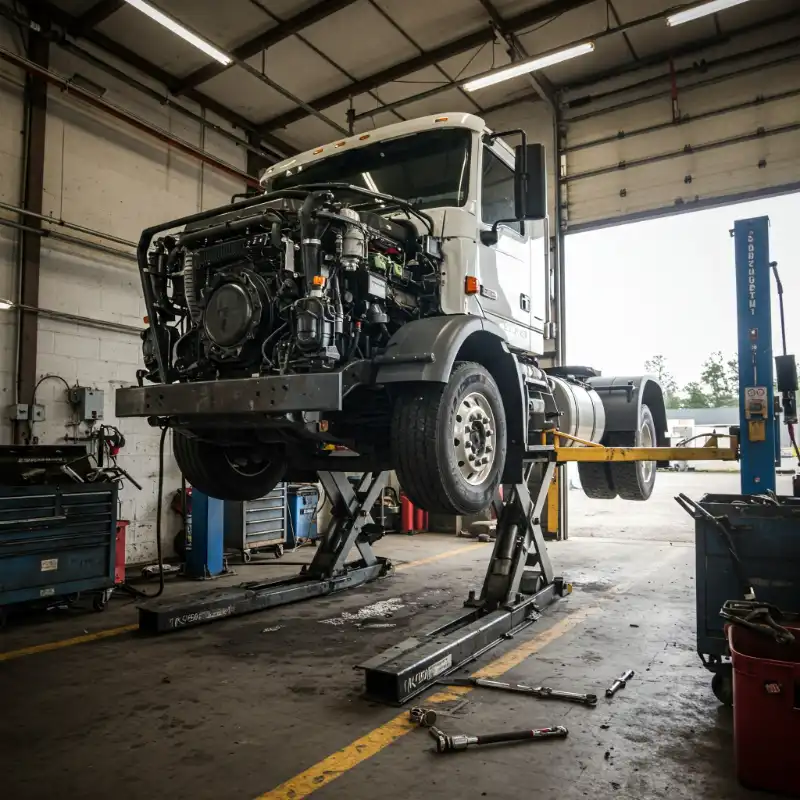In the world of fleet management, the stakes are high. Whether you oversee a small business fleet or a large-scale operation, ensuring the consistent performance of your vehicles is critical to safety, profitability, and customer satisfaction.
Why Consistent Fleet Inspections Are Non-Negotiable
Enhanced Safety for Drivers and the Public
Every time a truck hits the road, it must operate at optimal safety standards. From brakes to steering systems, a failure in any component can put your drivers and others on the road in danger. Fleet inspections help identify potential issues, ensuring they are addressed before they compromise safety. This proactive approach reduces the risk of accidents, which could lead to legal liabilities or worse.
Avoiding Breakdowns
Unplanned breakdowns are not just inconvenient; they are expensive. Towing costs, emergency repairs, and the revenue lost from delayed deliveries add up quickly. Consistent fleet inspections catch minor issues early—before they snowball into major problems that take vehicles out of service.
Regulatory Compliance
Fleet operators are required to adhere to state and federal regulations, including Department of Transportation (DOT) standards. Routine inspections ensure your vehicles remain compliant with these standards, minimizing the risk of fines, penalties, or failed roadside inspections.
Fuel Efficiency
Fleet inspections can also help improve fuel efficiency. Issues such as misaligned tires, under-inflated tires, and engine inefficiencies can increase fuel consumption. Regular checks ensure your vehicles are optimized for performance, saving you money in the long run.
Vehicle Lifespan
Investing in regular fleet inspections protects your vehicles over the long term. Addressing wear and tear early keeps components in better shape, ensuring your fleet operates efficiently for as long as possible.
What Should a Comprehensive Fleet Inspection Include?
Fleet inspections should cover all critical systems and components of your vehicles. Here’s what our inspections typically include:
Braking Systems
With heavy loads and long distances, brakes are a fleet's lifeline. Regular inspections should check for:
- Air pressure in brake systems.
- Wear and tear on brake shoes and drums.
- Proper functioning of slack adjusters.
Tire Maintenance
Tires are literally where the rubber meets the road. Inspect for:
- Proper inflation and alignment.
- Tread depth and signs of uneven wear.
- Sidewall damage or punctures.
Engine and After-Treatment Systems
Engines and their components require special attention:
- Look for leaks in coolant and oil systems.
- Ensure proper functioning of Diesel Particulate Filters (DPF) and Selective Catalytic Reduction (SCR) systems to maintain emissions compliance.
- Test the battery and alternator to avoid unexpected power failures.
Suspension and Steering
A truck’s suspension system absorbs shocks and supports loads. Regular checks should include:
- Inspection of leaf springs or air suspension systems for cracks or leaks.
- Ensuring the steering column and tie rods are responsive and free of play.
The Impact of Regular Inspections on Your Bottom Line
While fleet inspections may seem like an additional expense, they’re actually a cost-saving measure that benefits your business in multiple ways.
- Reducing Emergency Repairs: Emergency repairs are significantly more expensive than preventive maintenance. By catching issues early, regular inspections save you from unexpected expenses.
- Minimizing Vehicle Downtime: Downtime is costly—not just in terms of repair costs but also in lost revenue from delayed deliveries or missed opportunities. Proactive inspections keep your fleet on the road.
- Improving Customer Satisfaction: Timely deliveries and reliable service are the hallmarks of a successful fleet operation. Regular inspections ensure your vehicles are dependable, allowing you to meet customer expectations without fail.
- Protecting Your Reputation: A well-maintained fleet is a reflection of your professionalism and reliability. Conversely, breakdowns or unsafe vehicles can harm your reputation.
Customizing Fleet Maintenance Plans
At OTR Fleet Service, we tailor our inspection and maintenance plans to meet the needs of your operation. We create solutions that work for you.
Benefits of a Customized Plan:
- Scheduled inspections that align with your fleet’s operational demands.
- Comprehensive maintenance records for compliance and auditing purposes.
- Predictive maintenance strategies to prevent issues before they arise.
Schedule Your Fleet Inspection Today
Don't wait for issues to arise—stay proactive with OTR Fleet Service. Our team is ready to help you keep your fleet safe, compliant, and efficient. With locations in Houston, San Antonio, Dallas, and Austin, we’re always close by when you need us.
Contact us today to schedule an inspection or learn more about our customized maintenance plans. Let’s work together to keep your fleet on the road and operating at its best!









.webp)





























